The Digital Platform Workers’ Rights Act is a new law for workers who do app-based work like ride-sharing or food delivery jobs.
Do you work for a company that hires and gives you work through an app?
On July 1, 2025, the Digital Platform Workers’ Rights Act 2022 came into force. Workers covered by this law include drivers doing ride-share and food delivery that accept or decline work offered by digital platform companies such as Uber. Sometimes these companies use the term “gig workers” to describe this work.
Does this mean I have new rights at work? Here are the facts.
1) Companies must provide written information on your wages and working conditions
When you start working for the company, you should get:
- How your wage will be calculated and how your tips are collected
- What is your pay period and when is your pay day
- If there is a performance rating system and how it impacts assignments offered to you
When you are offered a work assignment, you should get:
- Estimated pay for each assignment and how it is calculated
- Reasons why that assignment is offered to you (such as your performance rating)
- What impact could there be if you fail to complete that assignment
Within 24 hours after a work assignment, you should get:
- The actual amount paid for the assignment
- Amount the company collected in tips and the amount of tip you will be paid
- How your wages were calculated (such as the distance traveled used in calculating pay).
*Work assignments are specific jobs offered by the digital platform company. For example, a worker assignments could be requests to provide a ride to a passenger or a food delivery.
2) You must be paid minimum wage for “engaged” time
Digital platform companies must pay workers at least minimum wage for engaged or active time when working. The Ontario government defines engaged time starting from when you accept an assignment to when you finish it (such as drop-off food or a passenger).
Engaged time does not include the time that you are on call or waiting for your assignment or returning from a food or passenger delivery. See more information about when work assignments begin and end for minimum wage calculation.
3) Companies cannot keep or deduct your tips
The company must inform you of the amount of tip they collect and the amount of tip that you will be paid for each assignment. The company cannot keep any of your tips.
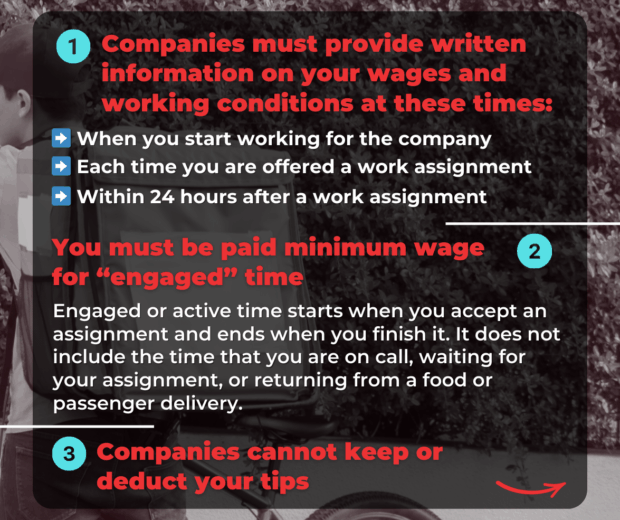
4) The company must give you a reason if they remove you from the company’s app
If you are removed from the platform, the company must provide you with a reason.
And you should also receive 2 weeks’ notice if you will be removed for more than 24 hours. But if the reason for your removal is serious (such as if you committed a crime) then the company does not need to give you this 2 week notice.
5) You can file a claim to get protection by the Ontario Ministry of Labour
It is illegal for the company to terminate or penalize you for trying to enforce your rights under this new law. If the digital platform company that you work for does not follow the law, you can file a claim at the Ministry of Labour. You have a two-year time limit to file from the date of the violation.
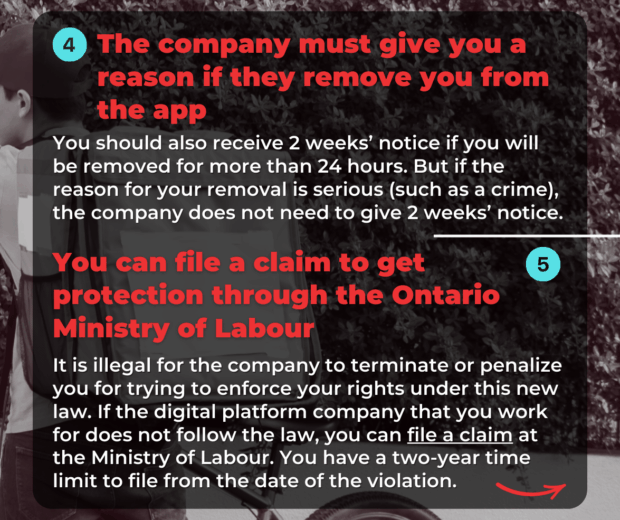
What’s wrong with this new law? Does it really protect us?
Unfortunately, the new Digital Platform Workers’ Rights Act does not meaningfully protect gig-worker rights.
1) This new law does not provide gig-workers access to basic labour rights
Since companies like Uber and Lyft first started, they have labeled their workers as self-employed or independent contractors. This meant that these workers were denied basic labour rights and protections under the Ontario Employment Standards Act. These rights include things like overtime, public holiday and vacation pay.
This new law does nothing to fix this problem. Instead it continues to exclude digital platform companies and their workers from our basic labour laws.
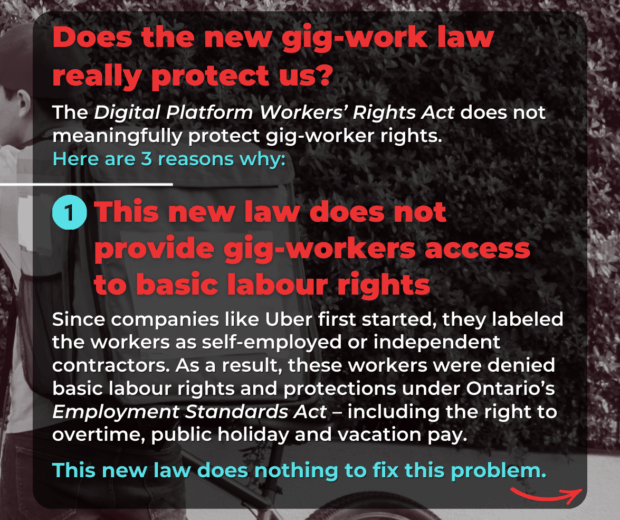
2) Workers are still not paid minimum wage for all hours worked
This law only guarantees minimum wage for “engaged” time. Engaged time is defined by the Ontario government to not include the time gig-workers are on call and waiting for their next assignment.
This is not fair. This is like saying that supermarket cashiers should only be paid when they are actively checking out groceries or that servers in a coffee shop should only be paid when there are customers in the store.
Another reason workers end up not making minimum wage each hour is that the law does not ensure gig-workers are compensated for employment-related expenses. For example, expenses like fuel, vehicle maintenance, insurance and phone plans. Instead, this law continues to allow these companies to pass all the risk and costs onto individual workers.
As a result, this means that instead of making sure that gig-workers get minimum wage, workers are likely to continue earning a sub-minimum wage. For example, RideFairTO (a non profit organization) reported that its ride-hail drivers earned an average of $6.37 an hour when workers included the ime spent waiting and costs of using their personal vehicle for work.
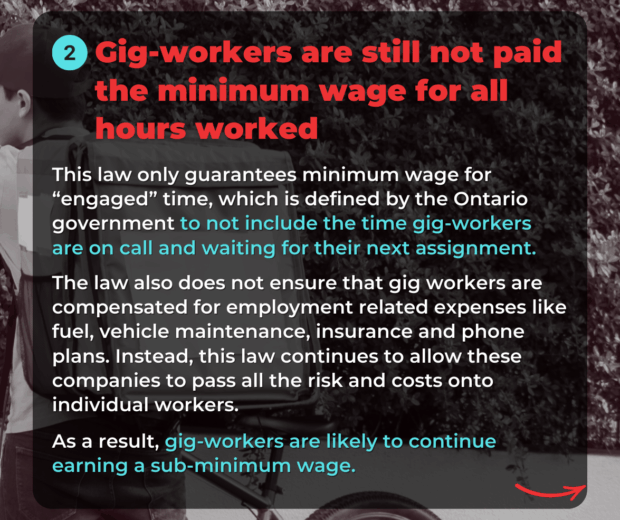
3) Knowing how you get paid does not mean you are paid fairly
The new law ensures gig-workers must get more information on how they are paid. However, just because you know how you are being paid does not mean you are being paid fairly.
Big corporations will do everything they can to squeeze workers for profit and use loopholes in our laws for their benefits. For example in 2024 when a $17.61 minimum wage was legislated for New York City ride-hail drivers, Uber intentionally locked out drivers from their apps to avoid paying hundreds of millions in wages to their drivers.
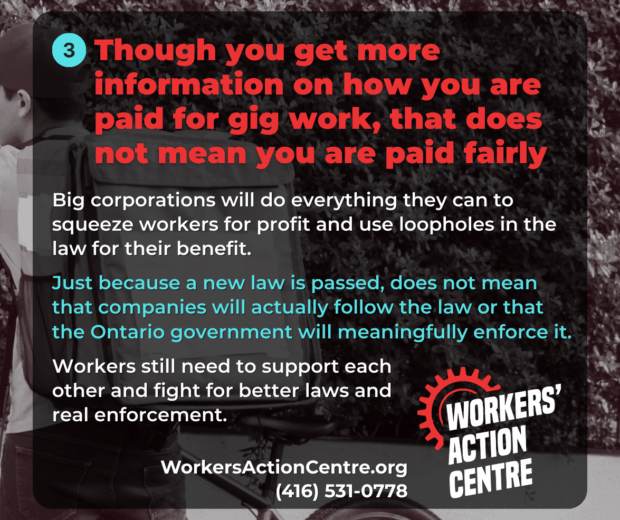
Just because a new law is passed, does not mean that companies will actually follow the law or that the Ontario government will meaningfully enforce these laws. Workers still need to support and protect each other and fight for better laws and enforcement of our laws.
If you have a question on how you are paid or being treated at work, please contact us at the Workers Action Centre. We can be reached on our workers rights hotline at (416) 531-0778 or by email at info@workersactioncentre.org.
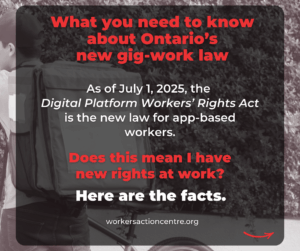 Share on
Share on